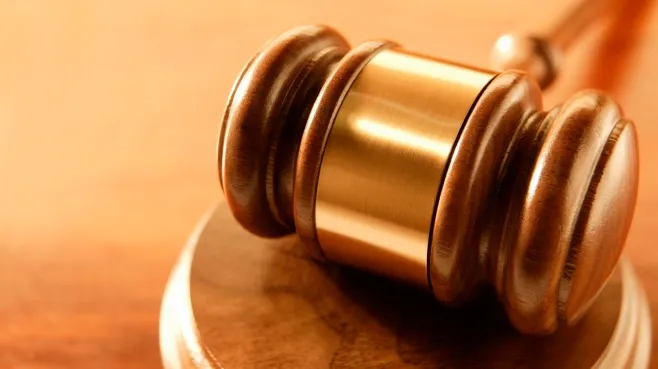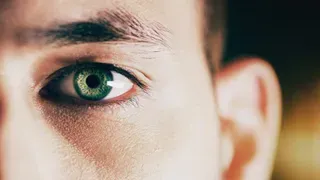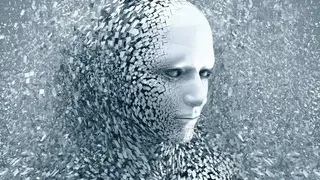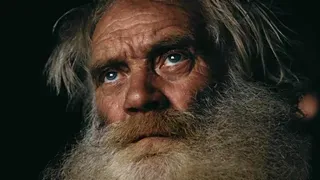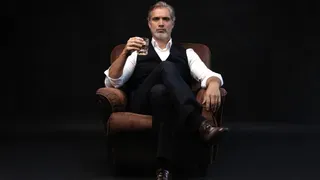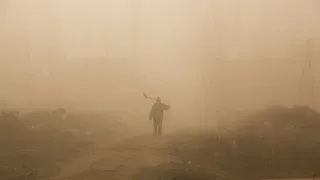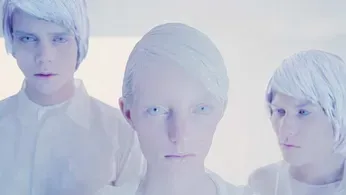
October 16, 2023
Peripheral Visions: Denisovans
Kilian Melloy READ TIME: 22 MIN.
Peripheral Visions: They coalesce in the soft blur of darkest shadows and take shape in the corner of your eye. But you won't see them coming... until it's too late.
Denisovans
"Get the children to safety!" Dr. Mariya's voice was loud and tense. The words were a scream that cut through the alarms.
Dr. Filipp turned to her, his face white. "No place is safe! We're being overrun – and no one is responding to the secure channel. The military was supposed to guard us. They've abandoned us!"
The security monitors showed that the facility was surrounded by the mob of thousands of men. Men in army fatigues, men in sweatshirts and body armor and masks. Men driving civilian pickups and military SUVs. Men carrying assault rifles and Russian flags and... and torches? Was I seeing this right?
Torches. What the hell was going on?
"Filipp!" Dr. Mariya barked at him. "We have the answer. Think! Stage Two of the project!"
Dr. Filipp's face was pure confusion for a moment and then he broke into a brief, happy grin. "Yes," he shouted back to her, his deeper voice barely carrying over the noise of the alarms. "MA five-oh-one! Yes!"
I had heard that before, though I didn't know what it meant: Military Asset 5-01. That's what it was. I'd seen the words printed out on papers and stenciled across crates as the work was being done in another part of the facility, Some kind of new research lab. Specialized equipment that had arrived under military guard and was even now secured by a soldier standing watch.
Dr. Filipp and Dr. Mariya herded all of us – all eighteen of us – out of the secure area and down a corridor toward a part of the facility I'd never seen before. We hurried as best we could, a couple of the older kids carrying the youngest in their arms. We were all dressed in warm clothes and carried our go bags on our backs: Knapsacks stuffed with rations and tools, with cold-weather sleeping bags secured below. Dr. Filipp had ordered the bags prepared when the first threatening messages had been intercepted and when support for General Agafonov seemed to be softening in the Duma and in the Presidential palace.
We made quite a sight hustling up that corridor. We looked like we were hurrying to get underway on a camping trip. But our destination wasn't the wilderness of Siberia that stretched all around the facility; we were headed to another, more fortified part of the facility. There was a door like something from a vault at the end of the corridor.
"Isn't a guard supposed to be on duty here?" Dr. Filipp shouted.
"Looks like he abandoned his post. Like you said," Dr. Mariya replied, working a security panel next to the massive door, "the military have left us on our own."
"The military is probably working with those conspiracy theorist assholes," Dr. Filipp said. The alarms were still audible, though distantly, and now he didn't need to shout. "Mariya, do you know the combination to get us in there?"
"I sure do..." There was a beep and the sound of locks unlatching, massive bolts drawing back. The vault door started to swing open.
"Maybe we can hunker down in there," I suggested.
Dr. Mariya grabbed me by the arm and guided me into the room beyond the great door. "Nothing will stop that mob," she told me. "There are soldiers out there along with civilians. And they have rocket launchers, grenades... it would take a while, but they'd get in. They are going to destroy this base."
"They want to kill us," I said, understanding this now for the first time. "Why?"
Dr. Mariya chuckled, but her face was a mask of anger and worry. "Why? Because humans are programmed to kill anyone different, that's why. Because they're afraid."
"But we're not going to hurt anyone."
"They think you're going to replace them," Dr. Mariya said. "And..." She shrugged, a grim smile now on her face. "They're right. Over time, you would have replaced them. Us. That was the whole point."
"But no," I said. "We were only supposed to..."
"Aaron, I don't have time to explain it to you. But trust me: Those people are crazy with fear. They are like those mobs in America. They don't understand, and they don't want to. They only want to destroy."
"But why?" I insisted.
"Humanity is weak," Dr. Mariya told me. "That's why we're dying out."
"But – "
"Mariya, better get this door shut!" Dr. Filipp called, directing the last of us into the large space.
I looked around as Dr. Mariya stepped to the control panel on this side of the door and began to key in commands and code numbers. The great door started swinging shut. Even as the door was in motion, she was crossing the room, headed for a row of consoles that looked like something from a space launch command center.
I looked around the room quickly. There were half a dozen such consoles, and a large readout screen on the far wall. It really did look like the space mission control center at Vostochny Cosmodrome, I thought.
Except that to one side, there was a large staging area. It looked almost like an arena, the kind of space they use for mixed martial arts fighting. "Everyone," Dr. Filipp said, "over there, in that area. Hurry up!"
An explosion echoed up the corridor, then another. The great vault door was almost closed. A moment later the sound of shouting a running feet came up the corridor, and the sound of gunfire.
"Idiots," Dr. Filipp muttered. "Shooting at everything in sight."
There was a scream, then a chorus of screams.
"They're killing the rest of the staff," Dr. Filipp said, his white face now gone gray.
The vault door closed, and the bolts and locks whirred once again. We were locked inside.
I shifted my attention from the room to the people in it. Eighteen of us, ranging in age from seventeen to five years old. Some of the kids were silent and scared; a few of the guys talked to each other in voices that sounded angry. The youngest were crying.
"Everyone," Dr. Mariya started.
"Let us out of here," Grigoriy, who was sixteen, tall and strong, and had been increasingly sure and commanding in recent months. He was furious at how our home and our friends... our caretakers... were being attacked. "Let us fight them. We're quicker, we're stronger..."
"They have guns," Dr. Filipp said. "And they have numbers. There are hundreds of them."
"More than a thousand," I corrected. It had been obvious from the images on the security screens that there were something like twelve hundred of them. They must have come from all the towns and cities near and even not so near; Siberia was no longer the isolated place it had been when it was used as a penal zone. But it was still rural, and isolated enough that people her thought of Moscow a distant, disconnected, disinterested in their lives.
And they tended to think they could get away with anything – even treason. Of course, if the military had thrown in with them, who knew? Maybe this wasn't treason. Maybe they would be decorated as Heroes of Liberty, the way the American insurrections were who killed one-third of their Duma... of their congress, I mean... a dozen years ago.
"Listen to me," Dr. Mariya said, as Grigoriy started to object. Grigoriy is a real alpha; even some of the researchers had started to cede to him. But Dr. Mariya let no one, even Grigoriy or me, dominate her. She was in charge; always had been. If anyone was our mother, other than Mother Russia herself, it was she.
Dr. Mariya turned to me. "Aaron, you have to watch over your brothers and sisters. We're going to send you somewhere safe. But we can't go with you. We have to stay here and make sure you get where you're going."
She turned back to the console, typed commands into the computer keyboard, then moved to another console and repeated the process. Lights came on... green, yellow, a few red. Dr. Mariya kept working, and Dr. Phillip joined her. They moved from console to console. The red lights turned yellow; the yellow lights tuned green; a deep, throbbing noise began and started building, growing more and more powerful. Vibrations pulsed through the room, and not just the vibrations from the explosives that the people outside were setting off to try and bring down the great vault door.
Dr. Mariya never stopped speaking as she worked.
"All of you – Grigoriy, Batanya, Bogdan, Darya, Daniil... all of you," she said. "You need to listen to Aaron. He's in charge now. He's going to keep you safe. Grigoriy, I need you in particular to understand this. You need to be Aaron's strong right arm. He's strong all by himself, but can't waste his time fighting you. You have to let him lead. You have to stand with him. Do you understand? If you don't, then all of you will end up as dead as all of us are going to be. I couldn't bear that, my children." She looked up at us. Her eyes were intense, commanding... and, in a way, pleading
"Don't say that!" Grigoriy was still enough of a child that he could protest even the obvious. Tears stood out in his eyes. He looked like he was about to have a tantrum, just as he used to throw when he was younger.
"Grigoriy," Dr. Mariya said, pausing her work just long enough to look up again – and look right at him. The warning in her voice and in her eyes was enough to quiet him down at once. Grigoriy looked over at me, as if for reassurance, and I nodded at him.
Dr. Mariya and Dr. Phillip glanced at each other and traded a nod. Dr. Mariya flipped open some sort of cover that guarded a switch. Then she flipped the switch.
The arena we were standing in started to buzz and light up. The air began to feel fizzy, like the mineral water they let us drink with supper. My skin tingled. A couple of the youngest children started shrieking, rubbing at themselves. Two of the boys and one of the girls stepped over to console them, and to hold them in place before they could run to Dr. Mariya or Dr. Phillip in panic. We were supposed to stay in the arena; they would make sure those orders were followed.
There was another deep vibration that shook the room even harder than the great power source making the throbbing noise. The door shook a little. Faint, muffled voices shouted on the other side of the door, and then the panel on the wall next to the door turned green and the great door began to open.
"God damn it," Dr. Filipp said,
Dr. Mariya moved to put herself between the door and us. Dr. Filipp stood at her side.
The throbbing grew more intense; the light flickered brighter and faster.
A soldier in duty grays pushed through the narrow gap as the vault door opened further. He could only get his head and one shoulder through the gap, but he was determined to get in as soon as possible. He turned his head, calling to people behind him, "If you morons would just wait one fucking minute, I could have gotten this door open faster." Then, as he pushed a little more of himself into the widening gap: "Hand me that rifle – they're about to escape..."
Dr. Filipp shut his eyes, his jaw clenched.
I looked at Dr. Mariya. She smiled at me, lovingly, full of tenderness. "Aaronka," she said, and my heart tore.
***
Dr. Mariya had told all of us the story, bit by bit, as we grew old enough to understand. I was the oldest. Maybe I heard more of the story from her than the others did. But my awareness that we were somehow special... and that we had a mission to fulfill... started much earlier than that.
I knew they were talking about us when I heard Dr. Mariya and Dr. Filipp discussing something about the immune system one day in the refectory. I was three years old. Back then, there were only four of us: Me; the twins, Batanya and Bogdan, who were two years old; Grigory, who was almost a year old; and Darya and Daniil, another set of twins, who were newborns and were in the medical ward because they were born ill.
The project had lost several babies. Dr. Mariya and Dr. Filipp were talking about this, and about the new babies and whether they would survive.
"The problem is the immune system," Dr. Filipp was saying. "It's too aggressive. We've had a thirty percent failure rate so far, and all but two of the miscarriages were due to immune response."
"But we don't want to dial it back too much," Dr. Mariya was arguing. "Not with the increase of carcinogens in the environment, and India threatening to use bioweapons."
"I still think we should take another look at the self-cleansing approach," another doctor, Dr. Sam, who was sitting with them, said.
I ate my tomato soup and listened.
"Stop calling it that," Dr. Mariya sighed.
"But that's in effect what it is," Dr. Sam told her. "Modern humans have lost the ability to cleanse their systems of toxins from the environment – an ability many animals still have. If we restore that, it might combat the problem of carcinogens. Then we can step down the immune response and maybe target it to specific kinds of viral and bacteriological threats."
"Which won't help if rumors that India and America have collaborated on a prion-based pathogen are true," Dr. Filipp put in.
"Who's to say we can't fine tune the immune response to address prions, too? Or manage to get the self-cleansing ability... apologies, Dr. Mariya, but I don't know what else to call it... to take care of prions?" Dr. Sam said.
Dr. Mariya looked at me and smiled when she saw I had finished my soup. "Now eat your grilled cheese," she said, pointing at my sandwich, which was cut into triangles.
That's all I remember about that specific episode, but it stands out in my mind as the first time I understood, however vaguely, that we were a project; we were being created with specific qualities. I also remember it because it was one of the rare times we ever ate something as "decadent" and "American" as grilled cheese sandwiches and tomato soup.
It wasn't until I was five or six that Dr. Mariya began telling me about the project itself: What it was, why it was, what its goals were.
"You see, Aaronka," she told me, "a long time ago, there were a different kind of people who lived near here. They were called Denisovans. Nobody knew much about them until a few years ago, when they found the remains of a Denisovan habitation in a cave – the same cave where they found the very first traces of the Denisovans."
"Denisova Cave," I said.
"Correct," she said. "Originally, only a few bone fragments were found. But what they discovered fifteen years ago was a trove of bones, a corner of the cave that the Denisovans must have used as a burial place."
"Why?"
"We don't know. Maybe there was a war, or an illness. But they found the remains of at least thirty individuals who lived sometime between 150,000 and 200,000 years ago. And the bones were so well preserved that they were able to reconstruct major sequences of the Denisovan DNA.
"But that's not all they found: There were stone tools, there were inscribed stones that might have had religious significance, or maybe the inscriptions even indicated the names of the individuals. It gave us so much more information about who they were that we were able to begin to understand how they lived and how they were able to survive the Siberian winters so long ago, when there was still ice here... massive sheets of ice a kilometer thick... and it was cold, so very cold no one alive today could have survived it the way they did, without heated homes and modern clothing..."
"How?" I asked. "How did they survive it?"
"They were so very strong. And they were resistant to illness, much more so than we are. And they could withstand colder temperatures than we can. They had many qualities modern humans have lost. They could go without food for very long periods of time, and they didn't need to eat as much as we do even when food was available. They could breathe thinner air – just like you can breath the oxygen-poor air Earth has today. As the air becomes more polluted and we have less oxygen, you'll thrive while homo sapiens slowly suffocates, victims of their own lust for deforestation and the predations they carried out on the oceans. And also, Denisovans had stamina we cannot even imagine."
"What's stamina?" I asked. The word was new.
"That means they could work and run and be active for a long time."
"They didn't get tired?"
"Not as quickly as we do," Dr. Mariya said. "All of this is very exciting, because the traits they had are the traits we need now, with crops failing all over the world, and drinking water drying up, and wars being fought with germs. Civilization might very well collapse before long. And how will we fragile modern humans survive the hardships to come? We won't – unless we borrow some of the traits that the Denisovans had."
"And you call us Denisovans sometimes," I said. "Me and the other kids. Did you clone us from them?"
"Not exactly," Dr. Mariya said. "Yes, you are clones... or, rather, half-clones... but you've been enhanced with genetic code from the Denisovans. The original Denisovans. That's why you're growing so big."
"You are bigger than me," I told her.
"Yes, but you are still a little boy. A very smart little boy, too. We think the Denisovans were quite intelligent."
"Why did they die out?" I asked.
"We still don't know, but we think their size had something to do with it, and also the way they were adapted to the cold. The glaciers limited how far they could travel, so there were only a few pockets of Denisovans here and there, and when the climate started the change, they couldn't adapted as well as homo sapiens. It's the same for the Neanderthals; they didn't adapt as well."
"Then why won't we die out?" I asked her.
I understand only now the grimace that crossed her face when I asked the question.
"The world is much warmer now," she told me. "And there are no ice sheets to stop you spreading out across the land. You don't have this trait, but the children we create in a few years will: They will be able to survive drinking contaminated water. That will be a major reason for the survival of the modern Denisovans. That, and your strength and stamina, and how little you need to eat. You are immune to many diseases, as well, and what you don't have immunity to you can quickly acquire immunity to through exposure. You might get sick... some of you might die... but most of you will survive and be immune to whatever made you sick. Between your physical traits and your intelligence, you have a very good chance of surviving. You and your children and the children of your children."
But there was a tense look around her eyes as she gave me this explanation, which now I know must have come from something else she was thinking: That homo sapiens, a selfish and suspicious animal, might be the thing we could not survive in the modern world.
Humans... the sort that dominated the Earth for so long and brought it to ruin... don't want to share; don't want to compete; don't want to accept or even tolerate others. Even among themselves they are quick and eager to kill those they deem to be different.
Dr. Mariya didn't tell me those things at the time, and I had another question that was worrying me. "What if the Earth gets cold again?" I asked.
Now the tension disappeared from around her eyes. "Don't worry," Dr. Mariya laughed. "Being resistant to cold is a useful trait, and there was no reason to take it away from you. We added that to your genome and extended it so that you are also more resistant to heat and to dryness. In other words," she added, "you have a much greater range of environmental conditions in which you can maintain internal homeostasis. You remember that word, don't you?"
I rolled my eyes. Of course I did. I remembered everything, just as I had been engineered to.
***
Dr. Filipp shut his eyes and clenched his jaw. When he spoke, his words sounded like they were being held back, muffled. By fear? Or by his taut jaw?
"How do we know they won't follow them back and kill them anyway?"
Dr. Maryia actually laughed at that. "Their tech can only overcome Vorenberg resistance to send someone back 50,000 years. MA 5-01 is different, incorporating technology based on whole new realms of physics. We're sending our children back 200,000 years – much farther back than any other portcullis can manage. This mob are stupidly going to destroy this entire facility, and the portcullis with it, meaning no one can use this technology to follow them. If General Agafonov has fallen out of favor... and the way the military is collaborating with these conspiracy-addled Cossacks suggests that he has... then he will have taken the precaution of destroying the labs and research he was overseeing. Our kids will be safe. It would take anyone else decades to replicate his people's work. But they don't have decades, those short-sighted fools... not at this point. Not now that they are cutting themselves off from the genetic gift our children would have given them."
"May the gods, if there are any, prove you right about that," Dr. Filipp said. "And may this damned machine work soon!"
It was hard to see through the wall of light, but across the room the soldier in gray fatigues was clumsily wrestling a weapon through the vault door's steadily widening opening. I saw him check the weapon over. What did he need to check? I wondered. Then I saw he was making sure the ammo clip was in place and the safety was disengaged,. He was still leaning into the room with his upper body, but as the vault door opened he was able to bring one leg into the room and brace himself on the floor.
He raised the rifle, resting the stock against his shoulder put his eye to the scope...
As he did this, Dr. Mariya looked up at the ceiling, where the flickering light seemed to emanate from nowhere. Then she smiled and met my eyes.
I heard the assault rifle firing as the light intensified, erasing the room and the soldier from sight and rendering Dr. Mariya and Dr. Filipp into vague silhouettes. I thought I saw blood flying from Dr. Mariya's form, thought I saw her start to stumble, but then the light flashed into vivid, mind-rending brilliance...
***
"I watched them kill Dr. Mariya," I told the others, "and it wasn't easy to see."
There was a silence in the group matched by the vast, icy landscape. We stood in a circle, some of us holding the youngest children. When the light had faded, we found ourselves here... in a cold place, a place with no buildings in sight, a place with no people except ourselves.
"Are we standing where the facility used to be?" Gigoriy asked.
"No," I told him. "We're standing where it will be... two hundred thousand years from now. Denisova Cave..." I nodded to the Northeast. "...is about twelve kilometers that way."
"Is that where we'll find others like ourselves?" Batanya asked. "Will they accept us? Will they fight us?"
"We should just kill them," Grigoriy said.
"We can't do that," I told him. "We need to avoid them. Find a place of our own. Build a settlement... create a future for ourselves that doesn't change the future for everyone else."
"Why not?" Grigoriy asked. "The future we came from was a failure. The world was about dead. That's why they created us. Maybe we can... maybe we should... do everything in our power to make sure that the world will be a different place. A better place."
"We can do that without killing anyone," I told him. "Killing is the homo sapiens solution to everything. Remember?"
It was something Dr. Mariya had told us often: That we were not exactly human, but that those who called us "inhuman" or "subhuman," or accused us of being animals, didn't know what they were talking about. As for those who dismissed us a "cavemen" and referred to us as brutes with no intellect, Dr. Mariya said, "How credible are people for whom blame is always the first response and killing the easy solution?"
My words had an effect. Grigoriy remembered Dr. Mariya's orders that he should support my decisions, and he fell silent – though I could tell he wasn't pleased.
There was more silence.
Grigoriy spoke first, of course, and he sounded accusatory. "Did you know about this time machine?" he asked.
"No," I said, "but I did know they were planning to obtain more complete Denisovan DNA. They had more genetic enhancements they wanted to make for the next generations..."
"Which won't happen now," Batanya said sadly, rocking one of the toddlers in her arms.
"And this was how they were gonna do it?" Grigoriy asked in disbelief. "Travel back int time a million years and, what, harvest some blood samples? Take some oral swabs?"
I shrugged. "I don't know know what their plans were. And it's also possible that Dr. Maiya and Dr. Filipp were concerned about the social media rumors and the protests and the public pressure. They saw how the Duma were starting to question the project. They probably feared some sort of attack would happen – just like it did. Maybe another reason for the time machine was they wanted to be able to put us some place where we'd be with others of our own kind, so to speak."
"So to speak," Grigoriy scoffed, "except, of course, you won't let us near them."
"Except that you want to fucking murder them," I shot back. I took a calming breath of cold air. It really was freezing – colder than anything I had ever experienced. "Anyway, over time I don't see how we can avoid coming into contact with them. Even... intermingling with them."
"Oh, like you'll be doing much of that," Grigoriy said. "They designed you to be sterile."
"I'm gay, not sterile," I reminded him. "And I was the prototype. The proof of principle. They weren't sure at first that they would even want to create a population of modern Denisovans that would cross-pollinate with
"Maybe the sooner we start interbreeding, the better," Grigoriy said.
"From fighting to fucking in one small step," Daniil said.
"You shut up!" Grigoriy snapped at him, and Daniil grinned at his sister. He and Darya always loved winding Grigoriy up, and ever since he hit adolescence it was easier than ever to do it.
"Perhaps we could go see for ourselves, though," Batanya suggested.
"See what?" I asked her.
"What's to see?" Grigoriy asked angrily. "Shut up and let the men to the thinking."
I silenced him with a glance, and repeated: "See what?"
"Well," Batanya said, "see what these original Denisovans are like. People in the 22nd century said we were stupid and had no souls. I don't think we should make the same mistake about the people who gave us our so, so special DNA."
Everyone traded glances, and even Grigoriy seemed to find Batanya's words enlightening.
"All right," I agreed. "We can go have a look. But at the first sign that we're about to encounter hostilities, we turn back."
"Why?" Grigoriy asked. "I'm not afraid of them."
"Nor am I," I told him, "but if we kill any of them, we might be hastening their extinction – and who knows? Maybe preventing ourselves from ever being created in the future"
"Because that burial pit might never be made if we wipe them out," Batanya said. "Either accidentally, or..." She looked pointedly at Grigoriy. "...on purpose."
Grigoriy made a gesture that was part dismissal of, and part surrender to, her logic.
It took us almost four hours on foot through the ice and snow, and we were lucky it only took us that long. The landscape was nothing like we were used to. We could have gotten completely lost. We didn't, though; we reached Denisova Cave, and it was still daylight when we got there. We saw no signs of anyone else along the way.
"Let's get closer," Grigoriy said when the cave came into sight, but no people of any kind – Denisovans, Neanderthals, or anyone else – did.
I nodded and we all moved toward the cave – cautiously at first, then with greater confidence, but finally in puzzlement. The cave was uninhabited. There was no sign anyone had ever lived there.
"Where are they?" Grigoriy asked, as though still hoping for a fight.
"Maybe they haven't arrived yet," Batanya said. "Dr. Mariya said that the dates were approximate..."
Realization seemed to descend upon us as a group, all at once.
"We're the Denisovans," Bogdan, who was usually quiet, said. "They created modern Denisovans because ancient Denisovans had physical qualities they needed for survival in the future. But the ancient Denisovans – us – had those qualities because Dr. Maryia and Dr. Filipp and the other researchers gave us those qualities in the first place."
"It's our bones they find in the cave," Batanya added. "Or those of our descendants."
"But why don't we survive?" Grigoryi asked. "If we're engineered for survival in ways homo sapiens have lost in the future... why are homo sapiens still the dominant species of humanity?"
"Because they're still a lot tougher now than they're going to be, as a species, later on," Batanya said.
"Like you know anything about it!" Grigoryi snapped at her.
I shook my head. "Only time will tell, but... probably it's something to do with the theories Dr. Mariya told us about. The world changes. Our descendants will have adapted to this ice age over thousands of years. They'll survive because our genetic template has been engineered to allow us to survive here, but over time other traits – traits not needed for survival in this specific environment – will be lost. Then, as the world warms out of this ice age, our people won't be as well suited to it any more as homo sapiens will."
"I still don't believe it," Grigoryi said. "We're our own origin? We came from... ourselves? That makes no sense to me."
Batanya started laughing. "And you were the one who made fun of me for reading those science fiction stories where time travel paradoxes like this happen. Shows how prepared and adapted for reality you were."
"Shut up!" Grigoryi told her.
It was time to move past the theorizing (and the quibbling) and get down to practicalities. Night would be coming soon. "The cave is perfect for shelter, for use as a base of operations," I said. "We have supplies and tools that will get us started. Our rations will run out well before winter ends... assuming this is winter... but we'll learn how to survive in the meantime. Eventually our tools will break or rust or be lost, but we'll learn to make tools of our own."
"What? Stone knives?" Grigoriy asked sarcastically.
"And bear skins," Batanya laughed, making some private joke of her own. Probably referencing one of her beloved sci-fi books.
"Stone knives, stone spearheads," I said. "Yes, we will learn to hunt, and we will need the tools to do it. Grigoriy," I said, turning to him, "you will be the one who saves us. You're a natural flintknapper. You can already create beautiful arrowheads." It was true; it was also a way to get Grigoriy thinking about his role in the group, and the constructive things he could do to help secure our future. In some ways he was the most homo sapiens of all of us, but his aggressive energy could be channeled toward useful ends.
And that included – I thought later on, as darkness fell and our small band of young people got settled into the cave that would be our home, and our children's home, for millennia to come – the way he and Batanya fought and flirted. Grigoriy acted like he despised Batanya, but we all knew better – including Batanya herself. Now, in the deepening shadows, as we prepared for the first night of our new lives, the two of them edged closer to each other, seeking warmth in the cold of the Siberian night.
I would have to be Dr. Maryia, and Dr. Filipp too, for these people, I thought... at least, until they grew up, which would not be long at all here, in the distant past, in the heart of an ice age.
And at the start of... who knew? Perhaps a more hopeful future, after all.
Next week we look at youth, and time, and mystery from a different angle... and angle located somewhere in the fourth, or maybe the sixth, dimension... as a scientist finally understands what his grand uncle was trying to tell him all those years ago. Be here to contemplate along with him the ramifications of "Chance and Necessity."
Kilian Melloy serves as EDGE Media Network's Associate Arts Editor and Staff Contributor. His professional memberships include the National Lesbian & Gay Journalists Association, the Boston Online Film Critics Association, The Gay and Lesbian Entertainment Critics Association, and the Boston Theater Critics Association's Elliot Norton Awards Committee.
